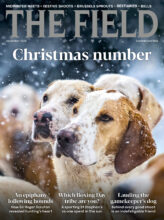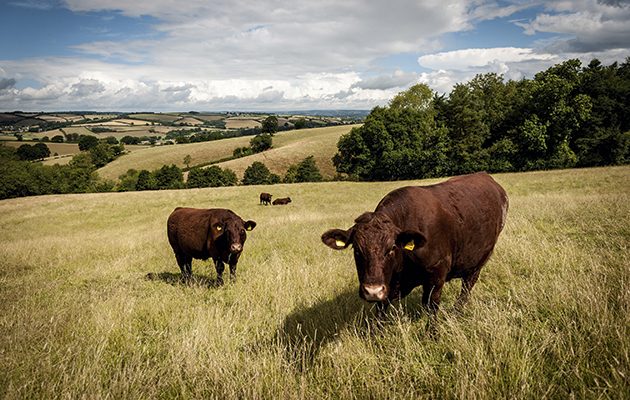Delivered direct to your door, meat boxes offer top-quality produce, ethical choices and convenience, says Hattie Ellis
Buying top-quality meat has never been easier. Meat boxes offer ethical choices, a huge variety of high-quality cuts and convenience, as Hattie Ellis discovers.
Excellent meat is needed in every country kitchen, but so is excellent game. Read the top 10 best pheasant recipes for enough inspiration to see you right through the season.
MEAT BOXES
In the 1950s, my father’s family’s Sunday roasting joint would travel down on the train from Scotland to London. This magnificent aitchbone was the centrepiece of the table and had to come from a trusted butcher. Such meat treats are now easily accessible; just a few taps on a smartphone delivers exceptional meat straight to your door from anywhere in the country.

Flat-iron steaks, a quick fry special, as delivered by Farmison & Co.
Meat boxes started so farmers could sell directly to the public. At its simplest, a quarter, half or even whole animal is cut up and packaged to keep in the freezer. By buying the less popular shoulder and breast of lamb as well as the cutlets and leg, the cost goes down considerably, working out at perhaps £2 to £3 per portion of top-quality meat. Often, the cheaper cuts are turned into mince or sausages so they are easy to cook. But you need a capacious freezer to shop this way and to eat a lot of one particular type of meat.
Meat boxes have evolved considerably, especially with the growth of online retailing, to suit today’s shopping habits and tastes. Ocado and supermarket online retail have made deliveries of fresh meat, rather than frozen, more normal. Amazon Prime is getting in on the act, with recent trials of fast-order, high-end meat. These online experts join a number of specialist meat companies that pride themselves on their quality and knowledge. This means that consumers can now shop around between suppliers. Rather than buying a boxful of one animal, these days you can also pick and choose, much as you would in a shop.
Meat lovers are turning to the internet for two reasons: supermarkets and even your local butcher, if you have one, do not always supply exactly what you want; beyond and perhaps above this, people find online shopping convenient, for fillet steak as well as for loo rolls.

Donald Russell’s party selection.
Market leader Donald Russell sells one million steaks a year to customers, not just in the UK but also expats in countries such as France, Spain and Portugal. Consumers in Germany and other continental countries buy because they regard British meat as top quality and especially love Scottish lamb. As a Royal Warrant holder, Russell also supplies HM The Queen, wherever she is in residence.
The company was set up in 1974 by a farmer, William Donald, who had a slaughterhouse in Aberdeenshire, a traditional centre of beef farming, and John Stone, a butcher who owned Russell Meats in London. The BSE crisis hit the company hard as a meat exporter. However, a favourable article in the press brought enquiries and led to a shift to mail order for the home customer. The business began to blast-freeze the meat when it realised people were ordering more than they needed and freezing it less efficiently at home.
Nowadays, Donald Russell’s meaty catalogue includes 70 ready-meals as well as a large range of frozen meat. Fillet, ribeye and sirloin make up the vast majority of the company’s steaks but it also offers a “speciality” steak box that includes the lesser-known onglet and bavette.

Mini beef bratwurst sausages, delivered by Donald Russell.
Russell’s beef is UK produced but the breed isn’t specified. For those looking for this approach, Farmison & Co is a Yorkshire-based company that specialises in fresh meat from heritage breeds.
CHOICE OF BREEDS
Around 45 traditional farms supply the company, each of which might have five or more breeds of beef on offer at any one time. You click not just on sirloin steak but perhaps on Longhorn, Shorthorn, Galloway, Highland or Aberdeen Angus.
The company was set up by two restaurateurs who loved the quality of native breeds but found it hard to buy outside the trade supply chain. “We’d go home and try to source the same produce locally and struggled to get proper traceability and true breeds,” says Farmison & Co co-founder Lee Simmonds.

Bavette steaks, included in the introductory heritage breed steak box from Farmison & Co.
Native breeds are the tops for quality, says Simmonds, and each has its own distinct character. “We’ve done taste testing with various breeds that come from the same farm and have the same feed and found them intrinsically different.”
Breed tasting notes are included on the website. Tamworth pork, for example, is “dense, aromatic, caramel” and Highland beef “long, umami, unique”.
Such a wide range and specific detail – you can also choose between meat that has been dry-aged for different lengths of time – gets to the heart of why you might buy online rather than from a butcher.
One company that has been selling native breeds meat for some 30 years is Pipers Farm in Devon. This network of around 25 family farms specialises in Red Ruby cattle and
Saddleback pork, as well as developing its own slow-grown breed of chicken with a great flavour and texture.

A meat box from Pipers Farm.
Online now makes up more than half of Pipers’ sales; the rest is through a shop in Exeter and wholesale customers. Owner Peter Greig appreciates the flexibility of online retail and the way it can shift to suit supply and demand. “It’s very exciting and dynamic,” he says. “You can adjust your shop window dozens of times a day if you want.”
EASY TO STORE
Of all Pipers’ innovations – which include breeding programmes, seam butchery and insistence on natural feed (mother’s milk and grass only for beef and sheep) – Greig thinks the way the meat is packed is probably the most important element of the business, as far as the customers are concerned, because it makes the meat so easy to store and use.
“In this digital age, the meat should be amazing to eat, the integrity beyond question and the nutritional value as good as it can get,” says Greig. “But, in all honesty, 75% of what we do every day is to deliver convenience.”

Three pure-meat varieties of “sliders” from Donald Russell.
The meat tends to be packed in portions that can be easily defrosted; just 30 minutes in cool water if you forget to put it in the fridge overnight.
For some, the point of a meat box is the direct connection with a small group of farms, like Pipers, or with just one particular farmer, like the original meat boxes.
GRASS ALL THE WAY
One such farmer is Ollie White, who has a county council farm in Somerset. White started with geese. “Goose is a niche product and even with the 57 we had in year one, we struggled to find local homes for these birds,” he says. “Your marketing has to spread out far and wide. The most efficient way to reach a big audience is online.”
From here, White has gone on to specialise in pasture-fed animals. To improve his knowledge, he took a Nuffield Farming Scholarship and travelled around the United States and Australia for two months talking to specialists about this way of farming before putting it into practice back home.

100% grass-fed meat in a Farm2fork meat box.
Aged 33, White is of the digital generation and through a well-designed website he connects to customers beyond his area, particularly those who are seeking healthier, 100% grass-fed meat – he is a member of The Pasture Fed Livestock Association – rather than animals that have been finished or given a basic diet of cereals.
Google Analytics will reveal who exactly is buying your product. By far the biggest customer base for White’s Farm2Fork business is London. The majority are 35- to 44-year-olds, the spread of male to female custom is about equal and they tend to be categorised as news junkies and travel buffs, too.
SEASONAL PRODUCTION
Farming and digital marketing are just two of the skills that a modern meat producer must master. The next is getting the customer to accept that true pasture-fed meat is seasonal and that a farmer of his small size needs to freeze the meat rather than selling it fresh (his geese are mostly sold fresh).
There are many variations on meat-box packaging and delivery systems but they all need to ensure that the meat remains cold even if the box has to sit in a porch for a few hours. Frozen meat clearly helps with this.

A large fruit, veg and meat box from Riverford.
Larger producers are more equipped to sell fresh meat and innovate to keep up with the latest consumer demands.
Riverford Organic Farmers delivers to around 47,000 homes a week in total, including fresh meat to around 4,000 of those. The company has recently done a customer survey and tailored its meat boxes accordingly. It has reduced its minimum spend from £25 to £17.50 as part of the “less but better” trend. The company’s everyday meat boxes now have quick-cooking cuts, such as mince, whereas the butchers boxes include a greater range of cuts for meat fans and keen cooks, such as beef brisket and seasonal specials such as venison.
The meat can be delivered alongside vegetable and fruit boxes or in the more recent recipe boxes, which include everything you need – apart from the pans – to produce two or three meals a week for two people.

Sheep on one of the small-scale organic farms that supplies Riverford.
Organic is a key issue, says Riverford’s Rachel Lovell. Riverford’s meat box sales went up 25% immediately after the Horsegate scandal in 2013 and have continued to rise ever since. “People want to be able to trust their meat. With organic they feel they can do that,” she says.
MEATY FATHER CHRISTMAS
There is a certain excitement about a meat delivery arriving at your door, like a present from a meaty Father Christmas. But there are also some issues.
Mail-order meat is generally vacuum-packed, a useful method for the seller but one that – to varying degrees, depending on how the method is used – draws out some of the juices and therefore also some of its succulence, flavour and sweetness.
Some of the meat is also frozen, though fresh meat sales are growing. Well-hung meat from slow-grown animals freezes well and it is certainly convenient if you are buying a large amount. A commercial freezer will do this better than one at home. But some meat-lovers think freezing can affect quality on thinner cuts in particular.

A fortnightly butchers hamper from Farmison.
Then there’s personal, face-to-face service. Many online meat companies offer to cut the meat to specification – for example, thick steaks – but it isn’t the same as going to a butcher, seeing what is best on the day and getting exactly what you want.
On top of this, there is a delivery charge that tends to be around £5.50. This is often waived if you buy a large amount. Occasionally, the cost of delivery is included in the advertised price but usually it appears as you click your way towards payment.
Meanwhile, the home-shopping culture has spread. Many good butchers now offer delivery in their area and sometimes this service is free.
MEAT AT YOUR FINGERTIPS
Donald Russell
www.donaldrussell.com
Farm2Fork
www.farm2fork.co.uk
Farmison & Co
www.farmison.com
Pipers Farm
pipersfarm.com
Riverford Organic Farmers
www.riverford.co.uk





